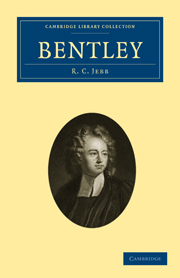Book contents
- Frontmatter
- PREFATORY NOTE
- Contents
- CHAPTER I EARLY LIFE. THE LETTER TO MILL
- CHAPTER II THE BOYLE LECTURES
- CHAPTER III LEARNED CORRESPONDENCE. THE KING'S LIBRARIAN
- CHAPTER IV THE CONTROVERSY ON THE LETTERS OF PHALARIS
- CHAPTER V BENTLEY'S DISSERTATION
- CHAPTER VI TRINITY COLLEGE, CAMBRIDGE
- CHAPTER VII BENTLEY AS MASTER OF TRINITY
- CHAPTER VIII LITERARY WORK AFTER 1700.—HORACE
- CHAPTER IX OTHER CLASSICAL STUDIES. — TERENCE. — MANILIUS. — HOMER
- CHAPTER X THE PROPOSED EDITION OF THE NEW TESTAMENT
- CHAPTER XI ENGLISH STYLE. EDITION OF PARADISE LOST
- CHAPTER XII DOMESTIC LIFE. LAST YEARS
- CHAPTER XIII BENTLEY'S PLACE IN THE HISTORY OF SCHOLARSHIP
CHAPTER XII - DOMESTIC LIFE. LAST YEARS
Published online by Cambridge University Press: 07 September 2010
- Frontmatter
- PREFATORY NOTE
- Contents
- CHAPTER I EARLY LIFE. THE LETTER TO MILL
- CHAPTER II THE BOYLE LECTURES
- CHAPTER III LEARNED CORRESPONDENCE. THE KING'S LIBRARIAN
- CHAPTER IV THE CONTROVERSY ON THE LETTERS OF PHALARIS
- CHAPTER V BENTLEY'S DISSERTATION
- CHAPTER VI TRINITY COLLEGE, CAMBRIDGE
- CHAPTER VII BENTLEY AS MASTER OF TRINITY
- CHAPTER VIII LITERARY WORK AFTER 1700.—HORACE
- CHAPTER IX OTHER CLASSICAL STUDIES. — TERENCE. — MANILIUS. — HOMER
- CHAPTER X THE PROPOSED EDITION OF THE NEW TESTAMENT
- CHAPTER XI ENGLISH STYLE. EDITION OF PARADISE LOST
- CHAPTER XII DOMESTIC LIFE. LAST YEARS
- CHAPTER XIII BENTLEY'S PLACE IN THE HISTORY OF SCHOLARSHIP
Summary
At the age of thirty-eight, when explaining his delay to answer Charles Boyle, Bentley spoke of his own ‘natural aversion to all quarrels and broils’ This has often, perhaps, been read with a smile by those who thought of his later feuds. I believe that it was quite true. Bentley was a born student. He was not, by innate impulse, a writer, still less an aspirant to prizes of the kind for which men chiefly wrangle. But his self-confidence had been exalted by the number of instances in which he had been able to explode fallacies, or to detect errors which had escaped the greatest of previous scholars. He became a dogmatic believer in the truth of his own instinctive perceptions. At last, opposition to his decrees struck him as a proof of deficient capacity, or else of moral obliquity. This habit of mind insensibly extended itself from verbal criticism into other fields of judgment. He grew less and less fit to deal with men on a basis of equal rights, because he too often carried into official or social intercourse the temper formed in his library by intellectual despotism over the blunders of the absent or the dead. He was rather too apt to treat those who dif fered from him as if they were various readings that had cropped up from ‘ scrub manuscripts,’ or ‘ scoundrel copies,’ as he has it in his reply to Middleton. He liked to efface such persons as he would expunge false concords, or to correct them as he would remedy flagrant instances of hiatus. This was what made him so specially unfit for the peaceable administration of a College.
- Type
- Chapter
- Information
- Bentley , pp. 192 - 205Publisher: Cambridge University PressPrint publication year: 2010First published in: 1882



